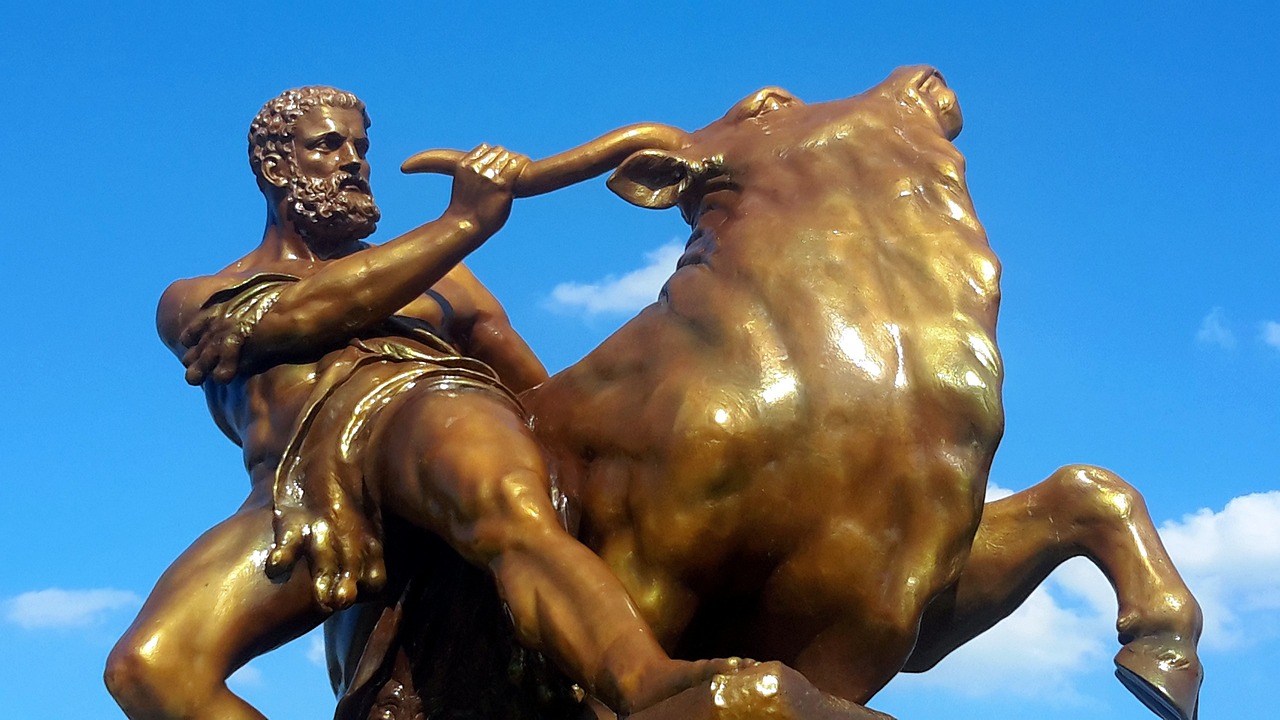Overview of Heracles
Heracles, known as the son of Zeus and the mortal Alcmene, stands as a prominent figure in Greek mythology, celebrated as both a hero and a demigod. Born from Zeus’ numerous affairs, he attracted the wrath of Hera, Zeus’ wife, who relentlessly sought to make his existence tumultuous. Among his myriad acts of bravery, the Twelve Labors serve as Heracles’ most significant achievements, thrust upon him by his cousin Eurystheus, King of Mycenae. As he overcame daunting obstacles and vanquished fearsome monsters, Heracles emerged a symbol of civilization and heroism. Despite his many commendable actions, he displayed a fiery temperament and violent tendencies, further complicating his narrative. Ultimately, upon his death, he was elevated to the status of a god.
Marriages and Relationships
Heracles’ marital life was marred by tragedy. His initial wife was Megara, but their union ended abruptly when Hera’s madness led him to slay their children, and in some versions, Megara as well. His final marriage was to Deianira, whose unintended act resulted in Heracles’ demise. In between, he was known for his numerous romantic entanglements, including that with Omphale, the Eastern queen who once commanded him to work on a loom while donning his lion skin.
After achieving godhood, Heracles married Hebe, the daughter of Hera and goddess of youth—a union symbolizing his reconciliation with Hera for the pain she inflicted on him throughout his life.
The Death of Heracles
Heracles met his demise due to a tragic mix-up involving his wife Deianira. Fearing she had lost his affection to another woman, she applied a love potion to his shirt, not realizing it was tainted with the deadly blood of the Hydra, given to her by the deceitful Centaur Nessus. Upon donning the shirt, Heracles experienced excruciating pain. Acknowledging his fate, he commanded the construction of a pyre. As he was consumed by the flames, his spirit ascended to Olympus to join his fellow gods.
Was Heracles a God?
Formally a demigod—being born of a god and a human—Heracles was granted immortality and a divine place among the gods upon his death. He was one of the few Greek heroes to be worshipped as a full god, particularly revered in regions such as Thebes, where he was born, as well as in Sparta, which claimed him as an ancestor.
The Twelve Labors of Heracles
The Twelve Labors represent iconic milestones in Heracles’ heroic narrative, each labor more challenging than the last. This arduous journey commenced after he killed his family in a fit of madness inflicted by Hera. To reconcile for his actions, he was tasked by Eurystheus with dangerous labors that often involved battling fierce monsters. Some notable tasks included defeating the Nemean Lion, the Lernaean Hydra, and capturing Cerberus from the Underworld—each labor designed to test Heracles to his limits.
Heracles’ triumphs over adversity only solidified his legacy. The tasks, initially limited to ten, expanded to twelve after Eurystheus sought ways to undermine the hero further. These labors are celebrated in various artistic depictions and continue to resonate within popular culture today.
Etymology, Attributes, and Mythological Background
The name Heracles translates to “Hera’s glory”, a nod to the goddess who despised him. Throughout Greek mythology, he is often depicted as an exceptionally strong individual, recognized by the iconic symbols of his lion skin and club. His lineage traces back to Zeus and Alcmene, leading to a childhood marked by Hera’s antagonism, setting the stage for his dramatic adventures.
Cultural Significance and Worship
Heracles enjoyed worship across ancient Greece, with numerous festivals, notably the Heracleia celebrated in various regions. Temples dedicated to him were constructed throughout Greece, reinforcing his lasting influence on Greek culture. As an emblem of strength and prowess, his tales recurrently appear in modern literature and film, with interpretations ranging from heroic feats to explorations of his intrinsic human flaws.
In Conclusion
Heracles’ legacy endures as one of mythology’s most compelling figures, encapsulating the essence of the heroic journey, marked by both monumental achievements and personal trials. His story, reflecting aspects of humanity’s struggles and triumphs, continues to inspire retellings in contemporary culture.



